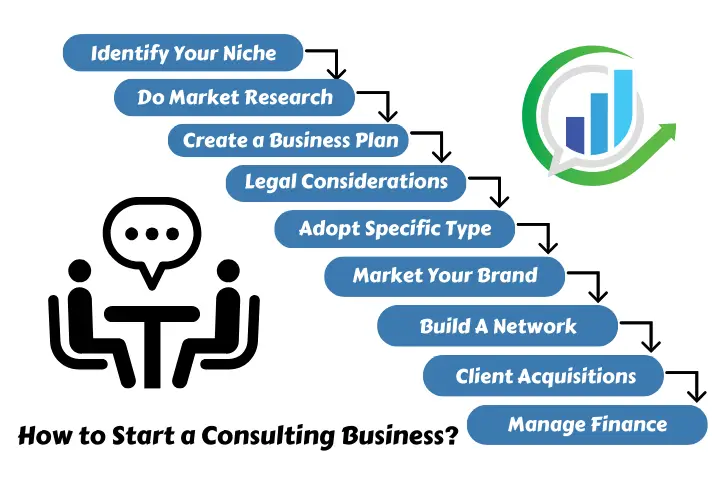In the professional and ever-evolving business environment, consulting businesses have become indispensable for enterprises needing specialized knowledge and skills. It is the best option for those who want to enhance their skills and expertise in their respective field. This article will provide comprehensive guidelines about “how to start a consulting business” from starting to growing it successfully.
Table of Contents
ToggleHow to Start a Consulting Business
Follow these steps to start a consulting business:

Identify Your Consulting Niche
First, you must select your consulting niche to start a consulting business. The niche is the field you are an expert in. Consulting comprises various fields and areas of expertise, like management, finance, marketing, technology, and other related fields. By focusing on a particular field of proficiency, you may enhance your ability to provide specialized solutions and appeal to your potential clients.
Market Research and Analysis
Do extensive market research before launching your consulting business. Get familiar with your ideal clientele, current market conditions, and service demands. Analyze your competitors to find your distinctive value proposition and learn how to differentiate yourself.
Business Planning
Your success in your consulting business depends on a well-structured business plan. It lays out your business’s intended direction, including your intended market, pricing plan, marketing strategy, and financial predictions. A solid business plan serves two purposes: guiding the company and encouraging possible investors.
Legal and Regulatory Considerations
Make sure that your consulting business adheres to all applicable laws and regulations. Among these tasks is deciding on the best legal form (sole proprietorship, partnership, or limited liability company) for your business and registering it with the right authorities. Consider purchasing professional liability insurance to safeguard both you and your clients since consulting often entails giving expert advice.
Types of Consulting Businesses
Many different types of consulting businesses, like management consulting, financial consulting, legal consulting, marketing consulting, etc., each focusing on specific markets or services. You have to select one that aligns with your skills and interests carefully.
Branding and Marketing
Successful branding and marketing are essential to building a name for your consulting business and attracting potential customers. For this, you should use different digital marketing methods like content marketing, social media, and search engine optimization (SEO); they will help spread your brand’s message and attract customers.
Building a Network
Networking is a crucial tool for consultants. You should join relevant professional groups, network with other consultants and clients, and participate in industry events. The more people you know, the more options you’ll have for collaboration and referral marketing.
Client Acquisition and Retention
Any consulting business relies on acquiring and retaining clients to survive. Give your clients what they want, show them how much you care, and keep in touch often. If your clients are happy, they will be more inclined to recommend you to others and work with you on future projects.
Managing Finances
Financial management is crucial to the long-term success of your consulting business. Create transparent pricing structures, monitor costs, and establish a reliable invoicing and payment system. It is best to use accounting software for optimizing financial procedures and guaranteeing precision.
Different Types of Consulting Businesses
Business consultants can select their preferred consulting business from a variety of options:

Management Consulting
Management consultants advise businesses about how to increase productivity and profitability. They examine processes, spot problems, and suggest enhancements for the company. Different aspects of business, like process optimization, organizational structure, and change management, may fall under this category.
Financial Consulting
Financial consultants provide various services as experts in financial matters, including investment advice, financial planning, and risk management. They aid organizations and individuals in making well-informed decisions regarding investments, budgeting, retirement planning, and risk management.
IT Consulting
Technology problems and their solutions are the focus of IT consultants. They help firms with IT strategy, software rollouts, cyber security, and IT infrastructure blueprinting. With their help, organizations can confidently use technology to achieve their objectives.
Marketing Consulting
Marketing consultants develop and execute effective marketing strategies. In addition to advising on advertising and promotional methods, they also perform market research and assist in identifying target groups. Their mission is to support companies in connecting with and engaging their target market.
Human Resources Consulting
HR consultants are specialists in the field of human resources. They provide advice on hiring, managing talent, managing relationships with employees, conducting performance reviews, and adhering to labor regulations. With the help of their expertise, companies have strong and successful HR practices.
Healthcare Consulting
Healthcare consultants help hospitals, clinics, and other healthcare facilities enhance their services and the quality of treatment their patients get. Regulatory compliance, healthcare policy and information technology, and operational efficiency are just a few of the specialities they provide. The quality of medical treatment is their focus.
Environmental Consulting
Environmental consultants advise firms on how to be environmentally responsible and compliant. They evaluate the effects on the environment, aid in meeting compliance standards, and suggest ecologically friendly methods. Their knowledge is vital to firms that want to lessen their environmental impact.
Legal Consulting
Legal consultants provide expert legal counsel in some instances. Intellectual property, contracts, regulations, and board structure are areas of expertise. Businesses benefit from their knowledge and ability to handle complicated legal matters.
Sales Consulting
Sales consultants work to enhance an organization’s sales operations and methods. They may also evaluate sales funnels and provide suggestions for improving productivity. Their objective is to boost sales and earnings.
Education Consulting
Education consultants help schools enhance their pedagogical practices, curricular offerings, and learner results. Teachers, curriculum designers, and policymakers might all benefit from their input. Their knowledge intends to improve students’ educational experience.
Real Estate Consulting
Real estate consultants provide market analysis, development, and investment in real estate. Whether for investment, development or just navigating the market, they help their customers make smart real estate choices.
Nonprofit Consulting
Nonprofit consultants assist nonprofit organizations in efficiently carrying out their missions. They offer services like grant writing, program assessment, and even advice for organizational growth. They provide nonprofits with the knowledge and skills to positively influence their communities.
Travel and Hospitality Consulting
This type of consultant works with hotels, travel agencies, and other hospitality-related businesses. They advise on business procedures, customer service upgrades, advertising approaches, and market developments. The travel and hospitality industries benefit significantly from their knowledge and experience.
Supply Chain Consulting
Supply chain consultants concentrate on improving supply chain logistics and operations. They look for ways to enhance inventory management, transportation, and supply chain efficiency and provide suggestions.
Crisis Management Consulting
Crisis management consultants aid firms in preventing and recovering from disruptive events. They anticipate and evaluate potential hazards and provide advice to those in need during times of crisis. With the help of their knowledge and experience, firms can face and overcome adversity with confidence.
Qualities of a successful business consultant
An accomplished business consultant is an authority in his industry. He has extensive training, experience, and knowledge in his industry. His expertise and experience enable him to deliver clients exact answers to their issues.

Strong Communication Skills
The root of effective consultancy is effective communication. Business Consultants need to be able to break down complex ideas into simple ones. Speaking and writing clearly, listening carefully, and asking good questions are all critical skills for success.
Client-Centric Approach
A reliable business consultant will always put the needs of their customer first. They try to become proficient in the client’s industry, business, and goals. Building trustworthy relationships with customers based on empathy and trust allows them to handle specific issues and effectively motivate desired outcomes.
Analytical and Problem-Solving Skills
Business consultants should be able to conduct in-depth analyses of situations to address complex business problems. They should have good analytical and problem-solving abilities. They must be systematic and creative in problem-solving, developing original approaches that provide tangible results for their clients.
Adaptability and Continuous Learning
As the business world is constantly evolving, effective consultants are adaptable in their approach. They monitor evolving market trends and strive to maintain proficiency to stay updated. Their commitment to studying throughout their lives ensures that their advice will be relevant even as times change.
Ethical Standards and Integrity
Integrity and honesty are crucial to consulting success. Consultants always put their client’s best interests first and act professionally while giving recommendations. Building a solid foundation of trust and credibility is essential for a successful consultant-client partnership.
Results-Driven Mindset
successful consultants prove their credibility through solid results. They resolve to take action, monitor their progress, and force themselves to stay the course. Results-oriented consulting professionals are valued by their clients and may succeed in the long term.
Consultants in the business world who exhibit these qualities consistently outperform their peers in terms of client satisfaction, positively impact company outcomes, and get recognition as authorities.
How to Grow a Consulting Business?
A planned strategy and a focus on valuing your clients are necessary for growing a consulting business. If you want to grow and thrive in the consulting business, consider the following advice:

Specialize and Differentiate
Find your place of strength or specialty within your industry. One way to distinguish yourself and get to the top of your field is to develop a niche area of expertise.
Deliver Exceptional Results
Maintain a high standard of service and reliability, always going above and beyond for your customers. Clients who are pleased with your work are more likely to recommend you to others and work with you in the future.
Build Strong Client Relationships
Develop deep, lasting relationships with your customers. Understand their requirements, provide information clearly, and address their issues. A happy consumer is more inclined to buy from you again.
Network and Establish a Presence
Participate in business events and make an effort to meet new people. To increase your visibility and network with other professionals, you should join relevant organizations, attend seminars, and actively participate in appropriate online forums.
Leverage Digital Marketing
Create a solid digital identity by maintaining a polished website and participating actively in online communities. Showcase your competence by disseminating useful material like case studies and customer feedback.
Seek Client Feedback and Testimonials
Request feedback from customers after finishing tasks. Case studies and endorsements from satisfied clients may speak volumes about the quality of your consulting services.
Offer Value-Added Services
Look for ways to expand your offers by finding related products and services. This may include offering customers unique resources like seminars, training programs, or exclusive tools.
Expand Your Service Offerings
Examine consumer preferences and market trends to identify opportunities to grow your consulting business. This might mean entering new sectors or giving specialized services inside your present specialization.
Hire and Collaborate with Experts
Consider teaming up with other consultants or bringing in outside expertise to expand your service offerings. As a result, you’ll be able to tackle more challenging and ambitious tasks.
Invest in Marketing and Branding
Spend money on marketing that reaches your ideal customers. This encompasses digital marketing strategies such as pay-per-click (PPC) and search engine optimization (SEO) campaigns.
Continuously Learn and Stay Updated
Keep up with your field’s latest developments, standards, and technology. Maintaining your place at the forefront of your industry requires a commitment to lifelong learning and professional growth.
Seek Referrals and Recommendations
Ask happy customers to refer you to their friends and family. Consider creating a formal referral program to reward patrons who spread the word about your business.
Track Key Performance Indicators (KPIs)
Monitor key performance indicators, including new-client spending, client retention, and project completion rates. Key performance indicators (KPIs) analysis aids in making educated business choices.
Explore New Markets and Geographies
Taking your consulting firm nationwide or even globally may be worthwhile to reach a wider audience.
Conclusion
Starting a consulting business requires research, preparation, and dedication to providing excellent service. This detailed guide will prepare you to start your consulting business on the right foot. Expertise, hard work, and a sincere desire to improve your customers’ business can get you far in the consulting industry. Companies must work to both attract new customers and keep their current ones happy to expand their business continuously. You may set up your consulting business for long-term success and growth by constantly delivering value, establishing solid partnerships, and responding to market changes.
Read more: https://majesticpulse.com/checklist-to-start-a-business-in-2024/



















